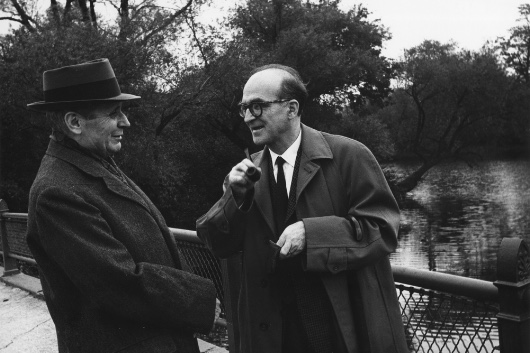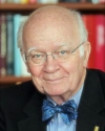Dead Lions
The clock ticked relentlessly as a typical faculty party of long ago was breaking up
 The clock ticked relentlessly as a typical faculty party of long ago was breaking up. Senior and superstar professor Mircea Eliade suddenly spoke during the scramble for coats. “Why does everyone talk about ‘dead lions’ with such urgency?” he asked. At each informal faculty gathering, he heard departing guests explaining, sometimes breathlessly, that they had to hurry home to take care of their “dead lions.” Eliade spoke many languages, from his native Romanian through French to broken English, and often heard about the needs and demands of these deceased lions. A patient interpreter explained to us that our colleague misheard the word “deadlines,” those standard killjoys, whether referring to the call of books and articles being written or curricular obligations.
The clock ticked relentlessly as a typical faculty party of long ago was breaking up. Senior and superstar professor Mircea Eliade suddenly spoke during the scramble for coats. “Why does everyone talk about ‘dead lions’ with such urgency?” he asked. At each informal faculty gathering, he heard departing guests explaining, sometimes breathlessly, that they had to hurry home to take care of their “dead lions.” Eliade spoke many languages, from his native Romanian through French to broken English, and often heard about the needs and demands of these deceased lions. A patient interpreter explained to us that our colleague misheard the word “deadlines,” those standard killjoys, whether referring to the call of books and articles being written or curricular obligations.
I’ve lived with deadlines since first breaking into print decades ago. They mark different time periods. For me, they have been experienced daily, weekly, fortnightly, monthly, quarterly, or annually, depending on what the deadline was for: tests, articles, reviews, books, etc. I’ve appreciated the ways in which these have functioned as calls for responsibility and, often, creativity. Now, this week’s column marks a change of pace as to when my dead lions will be growling, threatening, or promising. Ever since Sightings was initiated in the early years of the Martin Marty Center, the “lions” made their call weekly. Now, at the beginning of another academic year at our host institution, the Divinity School at the University of Chicago, I’ll be responding by meeting deadlines every fourth week. But enough about me; I want to talk about this column and the three other writers “ff.”
The name of our publication, Sightings, was chosen as a designation for one form of reflecting and communicating. The mission of the Center is to promote understanding of religion in public life—a sub-mission of the Divinity School itself. The dictionary informed the choice of term: a sighting is a “catching sight of something, especially something unusual or searched for,” such as a UFO or a whale in a harbor. In our case, what was sighted had to do with some object or event associated with “religion,” however defined. Sightings are too brief to be satisfying as full treatments of their subjects, but they can serve as alerts, provocations, tantalizations, or demonstrations of the risk of folly in dealing with the profound and protean aspects of what gets called “religion” or “the religious.”
For two decades and more one of the semiweekly issues of Sightings was written by me, the other by a faculty colleague or somebody else, usually an academic, who could help fulfill that mission. Having a team of regular, monthly “sighters” instead of just one greatly enlarges our scope and calls forth hitherto neglected fields of expertise. The three new regulars who will be joining me on Mondays will be familiar to any who have read Sightings over the years. I enthusiastically welcome them and look forward to their contributions.
Briefly, they are:
Wendy Doniger, whose global scope will also mean providing access to worlds beyond those of the “Western” religious traditions. Guarantee: readers will find in her columns commentary on spheres that a term like “Judeo-Christian” cannot contain.
Richard Rosengarten writes from within the Divinity School on traditions which relate elements and experiences of religion, however defined, to literature. His writings lure readers to zones where they will see how the study of religion interacts with other humanities fields.
William Schweiker has a distinguished record of writing on ethical dimensions of religion, many of which evoke controversial and urgent concerns in society. He will not lack topics that readers will welcome as being helpfully addressed by this veteran theological ethicist.
In addition to these Monday Sightings authors, we will be hearing from some regular or semi-regular voices on Thursdays, including Dean of Students, rabbi, and Ask Big Questions founder Joshua Feigelson—who kicked off the season last week—and Cynthia Lindner, director of the Divinity School’s MDiv program. All will benefit from the editing of Brett Colasacco, who stands in a tradition of graduate students or recently PhD’d scholars who have helped our various columnists communicate across the boundaries of their respective disciplines.
Even to anticipate what their columns will be about is exciting to people like me who have shared classrooms, mission, friendship, and fun with these featured Sightings writers. I could say much more, but as Professor Eliade would likely be saying by now: “Cut it short, go home, and take care of your dead lions.”
Image: Mircea Eliade (right), pictured with John U. Nef | Photo Credit: University of Chicago Photographic Archive, apf1-01844, Special Collections Research Center, University of Chicago Library
 Martin E. Marty (PhD’56) is the Fairfax M. Cone Distinguished Service Professor Emeritus of the History of Modern Christianity at the University of Chicago Divinity School. His biography, publications, and contact information can be found at www.memarty.com. Martin E. Marty (PhD’56) is the Fairfax M. Cone Distinguished Service Professor Emeritus of the History of Modern Christianity at the University of Chicago Divinity School. His biography, publications, and contact information can be found at www.memarty.com. |
Sightings is edited by Brett Colasacco (PhD’18). Sign up here to get Sightings by email. You can also follow us on Facebook and Twitter.


